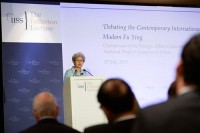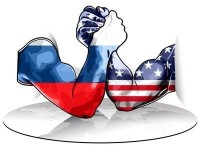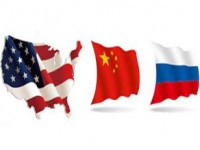William Overholt, Senior Fellow, Fung Global Institute
Sep 17, 2015
The gravest threat to American global leadership is neither Russia nor China but continued interest group-driven Congressional abandonment of the kind of balanced strategy that won the Cold War.
Tom Watkins, President and CEO of the Economic Council of Palm Beach County, FL
Aug 21, 2015
President Xi Jinping will visit the United States in September, partaking in a high stakes, scripted, state dinner with President Obama and other dignitaries at the White House. The Chinese leader will be in the neighborhood for the celebration of the 70th anniversary of the United Nations.

Fu Ying, Founding Chair of Center for International Security and Strategy, Tsinghua University; China's former Vice Minister of Foreign Affairs
Jul 31, 2015
Whether the world’s nations can adjust to changes and to work with instead of working against the new arrivals on the world stage is going to be a major test. China has chosen to integrate itself into the international order, and has greatly benefited from being part of it, so China should be seen as a partner, not a competitor.

Yin Chengde, Research Fellow, China Foundation for International Studies
Jul 22, 2015
The US pursues increasingly aggressive strategies against Russia, partly because it perceives Russia’s national power as too diminished to wage a meaningful fight, and now it has to face the music. Washington must cool things off by abandoning confrontation.
Yu Sui, Professor, China Center for Contemporary World Studies
Jul 08, 2015
Events commemorating the 70th anniversary of victory will be opportunities for China to demonstrate its determination to safeguard peace and promote development in the world, unswervingly pursue peaceful development and strengthen mutual trust with wartime allies, including the US.
Chen Xiangyang, Director and Research Professor, CICIR
Jul 03, 2015
The media and public opinion have become the new focuses of major-power competition, as the US struggles to maintain a supreme position in the current world order.

Jun 18, 2015
"Issue-specific partnership, instead of alliance" may become an outstanding feature of the three countries relations in the future, but their varying relationships challenge their ability to work together to meet global problems and coordinate global governance.
Yin Chengde, Research Fellow, China Foundation for International Studies
Jun 04, 2015
Mutual trust is essential for candid exchanges and sincere collaboration. This is an indispensable precondition for China and the U.S. to formulate a new-type major-country relationship and take advantage of historical opportunities such as President Xi’s upcoming U.S. visit.
Wu Zhenglong, Senior Research Fellow, China Foundation for International Studies
May 21, 2015
The 70th anniversary of WWII is a good time to reflect on global governance and progress in ending colonialism, while promoting peace. More nations need to observe the basic norms of the World Charter, the institutional structures must be adapted to new threats, and representation by smaller nations must be more equal.
Yan Xuetong, Distinguished Professor, Tsinghua University
Apr 20, 2015
Using a formula to define “comprehensive national strength,” Yan Xuetong explains how China has increased its national strength by expanding militarily, opening up economically, and maintaining strategic alliances. The world is increasingly witnessing bipolarization due to smaller nations strategically taking sides with either the U.S. or China for their securitization, yet this doesn't mean another Cold War.
Back to Top

- China-US Focus builds trust and understanding between the U.S. and China through open dialogue among thought leaders.
- Our Offerings
- Topics
- Videos
- Podcasts
- Columnists
- Research Reports
- Focus Digest
- Stay Connected
-
Thanks for signing up!
- Get the latest stories from China-US Focus weekly.